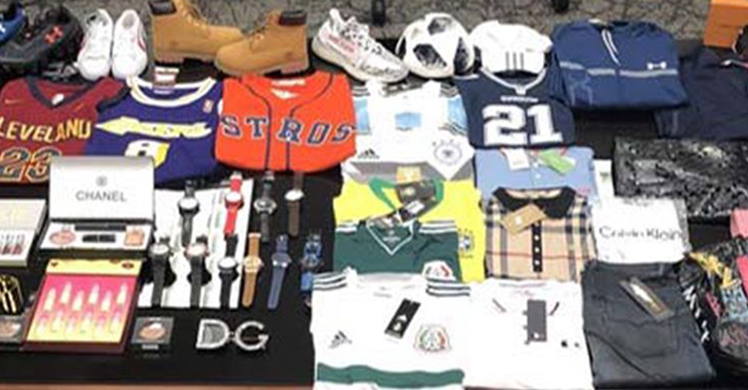Archived Content
In an effort to keep ICE.gov current, the archive contains content from a previous administration or is otherwise outdated. This information is archived and not reflective of current practice.
ICE seizes 181,000 counterfeit items worth nearly $43 million in Laredo, Texas
LAREDO, Texas — Special agents with U.S. Immigration and Customs Enforcement’s (ICE) Homeland Security Investigation (HSI) on Tuesday completed counting the counterfeit items seized in Laredo in June which totaled more than 181,000 items. HSI estimates the street value of the seized items at more than $42.9 million, which is HSI’s largest counterfeit seizure in Laredo.
In mid-June 2018, HSI special agents conducted surveillance over a three-day period and observed boxes containing suspected counterfeit merchandise being moved. During the enforcement action, HSI discovered that all shipping labels on all the boxes depicted fictitious delivery addresses in Laredo. HSI confirmed the boxes contained counterfeit merchandise and detained the boxes. HSI eventually seized 795 boxes containing 181,615 pieces of trademark-infringed merchandise, which included many counterfeited brands, such as the following names: Adidas, Apple, Calvin Klein, Casio, Chanel, Coach, Diesel, Fendi, Gucci, Hugo Boss, LG, Luis Vuitton, Mark Kors, Nike, Rolex, Samsung, Sony, Under Armor, Yves St. Laurent; and DC and Marvel Comics. Through its investigation, HSI discovered that the Laredo-based criminal organization was the same organization that agents identified from a separate May 2018 counterfeit merchandise seizure. During the May 2018 seizure, HSI seized $16.1 million in trademark infringed merchandise which was destined for illegal export to Mexico.
Taken together, the two seizures represent $59 million in seized counterfeit merchandise, more than 260,000 pieces of garments, consumer electronics, cosmetics and jewelry.
This HSI-led investigation is being assisted by U.S. Customs and Border Protection’s (CBP) Office of Field Operations, Mexican Customs and representatives from the trademark industry.
To date, no criminal charges have been filed in this case. This investigation remains ongoing.
According to HSI, the trademark-infringed merchandise seized was shipped in large boxes from China to an international cargo terminal located in Laredo, Texas. These boxes were manifested to fictitious Laredo recipients and addresses.
Historical information suggests that smugglers who typically transport illicit goods into Mexico often fail to file required export documents through CBP’s Automated Commercial Environment; they exploit the ports of entry by clandestinely smuggling merchandise to Mexico. Once in Mexico, the smugglers bribe Mexican cartels who often extort Mexican regulatory and law enforcement officials so that the merchandise passes without being inspected or paying import duties.
The HSI-led National Intellectual Property Rights Coordination Center (IPR Center), made up of 23 different federal agencies and four international agencies, and oversees enforcement activities targeting the trafficking of counterfeit goods. Last fiscal year, HSI and its sister agency, U.S. Customs and Border Protection, made more than 28,000 seizures involving counterfeit goods with an estimated value of almost $1.4 billion. The International Anti-Counterfeiting Coalition estimates intellectual property crime costs U.S. businesses several hundred billion dollars per year in lost revenues.
Anyone with information about the sale of counterfeit items can submit a tip at IPRCenter.gov. Reports can also be made to the HSI tip line at 1-866-DHS-2-ICE.


